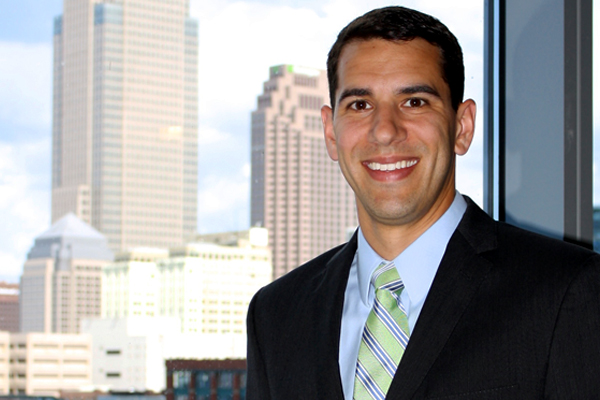Dayton Docket

From Engineer to Patent Lawyer
Patrick Clunk didn't wait until he was finished with law school to take the Patent Bar, officially known as the Examination for Registration to Practice in Patent Cases Before the United States Patent and Trademark Office.
Clunk knew he was eligible to sit for the test because he already held an undergraduate degree in mechanical engineering from The University of Dayton.
Taking the test after only one year of law school, Clunk admitted, “If I had waited until I took a patent course, it would have been easier.” But taking the easy road is not his style. Hard work and self-study is.
Armed as a credentialed patent agent, he was able to better market himself after his second year of law school and landed a job in Dayton during the school year and in Cleveland later the following summer.
“I knew I wanted to go to law school, but I didn't know about patent law until a UD law professor came to our senior year seminar and discussed patent law as an option for engineers,” explained Clunk, who is now counsel at the Cleveland office of Tucker Ellis LLP. He provides clients with strategic intellectual property counsel and advice on securing, protecting, clearing, and licensing patents, trademarks, copyrights and other intellectual property.
It surprised Clunk that his engineering background prepared him so well for law school given the fact that he did little reading as an undergrad. Yet with a strong work ethic he realized, “I was well prepared for law school because of the study habits I learned as an engineering student. The most difficult aspect was time management and the need to be able to dedicate countless hours to studying.”
Clunk’s primary practice is patent preparation and prosecution (drafting patent applications and corresponding with the United States Patent and Trademark Office), where he works with a variety of technologies from surgical equipment to golf accessories. Clunk is energized by his role in finding the right types of intellectual property to protect his clients' interests. Recently he's been able to use his experience to get involved in a patent infringement matter involving patents asserted in the U.S. and Europe.
Graduating from Dayton Law after concentrating his studies within the Program in Law and Technology's (PILT) Intellectual Property program, Clunk acknowledged that one particular class shaped his future. “There was a practical Patent Preparation and Prosecution class during my third year where we drafted a patent application for a toilet annunciator ‘invented’ by our professor.” He admitted a talking toilet was a silly invention, but added, “I’ve actually dealt with sillier in practice.”
By leveraging his two degrees from UD, Clunk assists clients in all aspects of intellectual property and he has worked with other professionals around the world. He also teams with business lawyers performing due diligence analysis and providing valuations on intellectual property portfolios for transactional legal matters such as mergers and acquisitions. He also has rare hands-on experience with patent interferences – disputes related to which inventor invented an idea first – before the United States Patent Trial and Appeals Board.
Clunk has secured, protected, and/or defended clients’ intellectual property rights in various mechanical and electrical technologies, including image-guided surgical systems, surgical fixing and positioning devices, endoscopic accessories, urological devices, trailer lighting and towing accessories, mobile communication devices, aerospace control systems, gas turbine fuel systems, filtration systems, refrigeration systems, and hydraulic pumps and motors.
His decision to attend the Dayton Law was multi-faceted and influenced by the PILT curriculum, but he had also grown to love UD from his time as an undergrad where he met his wife in his freshman year walking up Stuart Hill. They married during his time in law school and now have two children.
Although Clunk’s young family might disagree, he insisted the rules he lives by can be found in the Manual of Patent Examining Procedure (MPEP), published by the United States Patent and Trademark Office. He might also follow the rules of golf and soccer, his games of choice outside of the office.
